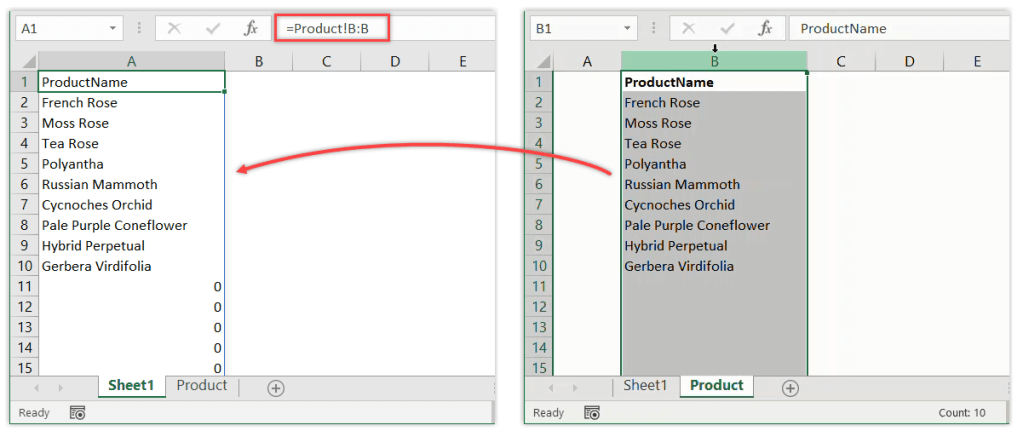Link Excel Sheets: Quick, Easy Guide

Linking Excel sheets together is a fundamental skill for anyone who uses Microsoft Excel for data management and analysis. Whether you're a business analyst, an accountant, or just someone who likes to keep their personal records in order, understanding how to link data across different sheets can significantly enhance your efficiency. This guide will walk you through the steps to link Excel sheets in a straightforward, easy-to-understand manner.
Understanding the Basics of Excel Linking

Before we dive into the technical aspects of linking, let’s understand why linking Excel sheets is useful:
- Data Consolidation: You can consolidate data from multiple sources into one view.
- Automation: When one sheet’s data changes, all linked sheets automatically update.
- Reducing Errors: By linking, you reduce the chance of manual data entry errors.

How to Link Data in Excel

The process to link data between sheets in Excel involves referencing cells or ranges from other sheets. Here’s how:
Using Cell References

To link data between two sheets:
- Open your Excel workbook with at least two sheets you want to link.
- Select the cell where you want the linked data to appear.
- Type an equal sign (=) to start a formula.
- Now, click on the sheet tab where the source data resides.
- Click the cell with the data you want to link to, and press Enter.
Example:

Suppose you have two sheets named ‘Sheet1’ and ‘Sheet2’, and you want to link a value from cell A1 in ‘Sheet1’ to cell B1 in ‘Sheet2’:
With cell B1 in ‘Sheet2’ selected, you would type:
=Sheet1!A1
This formula in 'Sheet2' links to cell A1 in 'Sheet1', meaning any change in A1 will be reflected in B1.
💡 Note: When linking sheets in the same workbook, you need only the sheet name. For different workbooks, include the full path and file name.
Using Named Ranges

Named ranges are a powerful tool for managing links in Excel:
- Go to the source sheet where your data is located.
- Select the range or cell you want to name.
- Use the “Name Box” above the column headers to give it a name (e.g., ‘SalesData’).
- Go to the destination sheet where you want the link.
- Type the formula with the named range:
=SalesData
| Step | Description |
|---|---|
| 1 | Select the cell or range to name. |
| 2 | Assign a name through the “Name Box”. |
| 3 | Use the named range in formulas. |

🌟 Note: Named ranges make it easier to manage complex formulas and provide clarity in large datasets.
Troubleshooting Common Issues

Here are some common problems you might encounter when linking Excel sheets:
- #REF! Error: This occurs if the source cell or range has been deleted or renamed.
- Broken Links: Links might break if you move the files or rename the sheets. Always update the links manually in this case.
- Slow Performance: Too many links can slow down Excel. Minimize links or consider using a database for extensive linking needs.
Advanced Linking Techniques

Once you master the basics, here are some advanced techniques:
- 3D References: Use references across multiple sheets in a 3D formula.
- Using Excel Tables: Linking to tables is straightforward and dynamic as tables automatically adjust references.
- External Links: Link to data from other Excel workbooks, even on different networks.
Linking Excel sheets is not just a technical skill but also a strategic one. It allows for dynamic data management, where changes in one part of the workbook immediately reflect across all linked sheets. This method reduces the time spent on updating spreadsheets and minimizes the risk of errors associated with manual updates. By understanding how to link sheets effectively, you can:
- Streamline your data workflows.
- Ensure real-time data consistency.
- Facilitate collaborative work environments.
How can I ensure that my links remain intact if I move or rename my Excel file?

+
Always use absolute references when linking between sheets in different files. If you rename or move the source file, update the links manually using the “Edit Links” dialog in Excel.
What happens if the source cell or range I’m linking to is deleted?

+
You will see a #REF! error in the linked cell, indicating that the reference does not exist. You’ll need to update the link or remove it if the source data has been permanently deleted.
Can I link cells from different Excel workbooks?

+
Yes, you can link cells from different workbooks using external references. Just ensure both workbooks are open, and follow the same linking process, but include the full path to the other workbook in the formula.
Is there a limit to how many sheets or cells I can link?

+
Excel does not impose a strict limit on the number of links, but too many can degrade performance. Consider using databases or consolidating data into fewer sheets for optimal performance.
What is the benefit of using Named Ranges in Excel linking?

+
Named Ranges make your formulas easier to read and manage, especially in complex sheets. They also automatically adjust when cells or ranges change, reducing errors from incorrect references.



